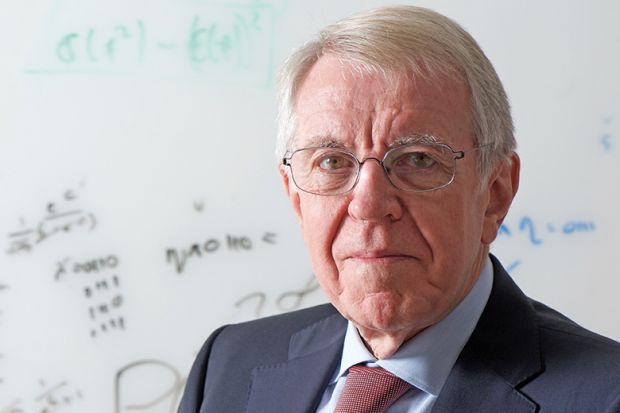Sir Alan Wilson is chief executive of the Alan Turing Institute. Initially trained as a physicist, he moved into the social sciences, working at the UK’s Ministry of Transport and as assistant director of the Centre for Environmental Studies thinktank, as well as in higher education. He took up a position as professor of urban and regional geography at the University of Leeds in 1970 and rose to become vice-chancellor (1991-2004). He then became the UK’s first director general for higher education, advising successive secretaries of state (2004-07). He also served as chairman of the Arts and Humanities Research Council (2007-13). It has just been announced that he will receive an honorary degree from the School of Advanced Study, University of London, in December.
Where and when were you born?
Bradford, Yorkshire, 8 January 1939.
How has this shaped you?
My parents both left school at 14 but had a strong sense that education was important for me and this, combined with an element of Methodism, gave me a positive work ethic that has never left me.
What does the honorary degree from the School of Advanced Study mean to you?
It is an honour and a privilege. I was particularly touched that my contribution to the arts and humanities was recognised.
What kind of undergraduate were you?
A relatively serious scholarship student. I thought Cambridge was magical from the moment that I was interviewed there. I was taught by the likes of Fred Hoyle on general relativity and Paul Dirac on quantum mechanics.
What made you shift from physics to the social sciences?
I left Cambridge to work at the Rutherford Lab at Harwell. I enjoyed the work – analysing bubble chamber events, writing big computer programs – but I decided that I wanted to do something more “useful” while still being a mathematician. I must have applied for 30 jobs and failed to get one. So I took a different route and was elected as a Labour councillor in Oxford. That was an important early experience for me, functioning in a political environment, convinced that it was possible to change things for the better. Then I did get a research job in Oxford, working with a group of economists on transport modelling. The deal was that I did all their maths and computing, and they taught me economics along the way! I was lucky enough to solve a problem that was waiting to be solved – how to model transport flows in cities – and I was accepted as a social scientist.
What did you see as the main challenges as vice-chancellor of Leeds?
The university seemed rather sleepy and it felt underfunded. The solution was growth, combined with budgets devolved to departments providing the incentive. We accelerated and grew from 13,000 to 33,000 [students] in 13 years.
What was it like to move to a role advising ministers?
It was important to transform myself into a civil servant and not be a know-all on higher education. I was very lucky with the ministers I worked with – Charles Clarke, Ruth Kelly and Alan Johnson – all extremely able and all enjoyed a good discussion.
What do you regard as your core achievement in that role?
Some success in reducing bureaucracy: the letter of guidance to the funding council in the year before I arrived had tens of pages; I managed to reduce that to low single figures. The system continued to grow. Research funding was ring-fenced, and we established the Office for Fair Access to support widening access.
How well have successive governments understood the fundamental needs of British higher education?
There has been good support for continuing to expand student numbers and for research. This has created funding challenges, and the mix of government support and student fees is probably now out of kilter. Higher education has always in part been instrumental – medicine, law, engineering – and this is important, but I would like the core motivation for supporting universities to be educational.
You have also chaired the AHRC. Is it sometimes an uphill struggle to make the case for the arts and humanities?
It can be, but it has helped that key players such as Lord Willetts and Sir Mark Walport have been very supportive, and for the best of reasons. It has always helped, however, that arts and humanities research underpins much of the creative industries and attracts a large number of the overseas students who come to the UK.
What is the main focus of your current role at the Alan Turing Institute?
The big data revolution, continually increasing computer power and a surge of development in artificial intelligence are transforming how we live and how the future economy will work. My job is to help position the institute at the heart of this and to combine these elements into the new interdisciplinary coalition that is “data science”.
Tell us about someone you’ve always admired.
When I was at school, I was a great admirer of Bertrand Russell, whose books taught me a lot about clear thinking and good writing. There was a spin-off in more recent years. At the first meeting of what became the Russell Group [of large research-intensive UK universities], after a very long debate and no agreement, I claim the prize for successfully proposing the name on two grounds: Bertrand Russell gave it some intellectual respectability, and we were meeting in the Russell Hotel!
What would you like to be remembered for?
Two good ideas in urban modelling that are still in play. And I hope that I have contributed to the growth of higher education in the spirit of Lord Boyle’s phrase when he was vice-chancellor at Leeds: that universities are places for “thinking things through”.
matthew.reisz@timeshighereducation.com
Appointments
Bucks New University has appointed Nick Braisby deputy vice-chancellor. Professor Braisby, currently pro vice-chancellor at the University of West London, joins the High Wycombe-based institution at the start of the autumn term. A chartered psycholo-gist, he was previously head of psychology and professor of cognitive science at London South Bank University and held posts at the University of Winchester, the Open University and London Guildhall University (now part of London Metropolitan University). “The higher education sector is experiencing great change, but Bucks New Univer-sity’s mission to combine excellence in employment-focused and skills-based education with high-quality applied research is more relevant than ever,” Professor Braisby said.
Sarah Barrow has been named pro vice-chancellor for arts and humanities at the University of East Anglia. Previously deputy head of the College of Arts at the University of Lincoln, she has also led the English, film, communi-cations and media studies depart-ment at Anglia Ruskin University. “UEA is a university with a strong social conscience, and many of our arts and humanities projects are focused on promoting social welfare and justice,” Professor Barrow said. “I’m looking forward to working with my colleagues, students, graduates and our partners to continue to highlight important issues and create change, as well as to advocate the broader value of studying the arts and humanities.”
Leeds Beckett University has appointed two new professors of teacher education to its Carnegie School of Education. Jonathan Glazzard has joined from Leeds Trinity University, where he was head of academic development, while Rachel Lofthouse has arrived from Newcastle University, where she was senior lecturer in education.
Emyr Roberts, currently chief executive of Natural Resources Wales, has been appointed the next chair of council at Aberystwyth University.
POSTSCRIPT:
Print headline: HE & me
Register to continue
Why register?
- Registration is free and only takes a moment
- Once registered, you can read 3 articles a month
- Sign up for our newsletter
Subscribe
Or subscribe for unlimited access to:
- Unlimited access to news, views, insights & reviews
- Digital editions
- Digital access to THE’s university and college rankings analysis
Already registered or a current subscriber? Login








